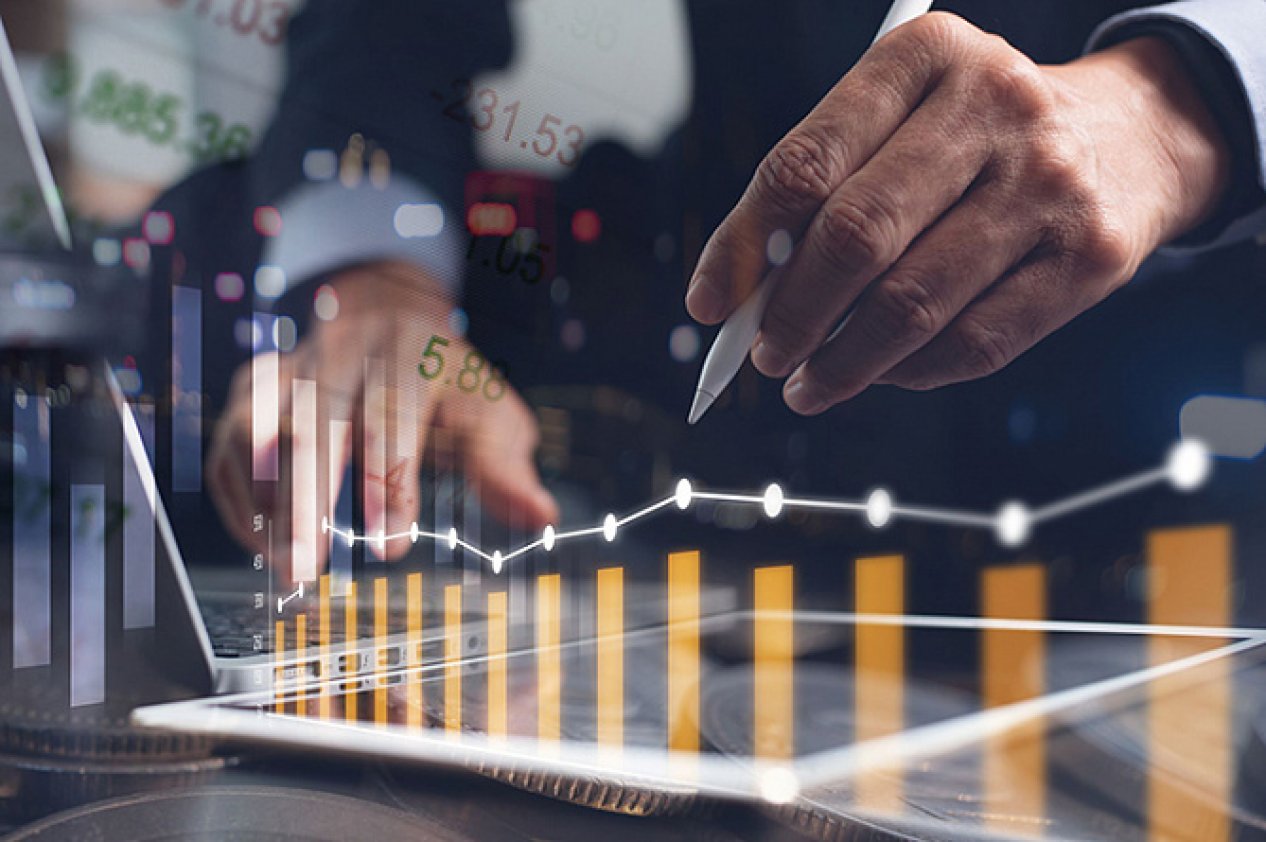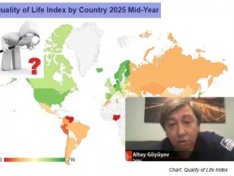
The inflow of foreign investments to Armenia in January-June 2022 amounted to 41,031.9 million drams against 132,782.1 million drams for the same period in 2021, according to the National Statistical Committee of the Republic.
At the same time, out of this volume, the inflow of foreign direct investment in the reporting period amounted to 76,554.4 million drams against 42,677.7 million drams in the first half of 2021.
The highest indicator of investments was registered from Russia: net inflow in January-June of the current year amounted to 47,279.2 million drams (an increase of 48,506.9 million drams), and direct investments - 57,495.1 million drams (an increase of 83,724.4 million drams). Next in terms of volume are investments from Italy, which in the first half of 2022 amounted to 5,212.3 million drams, having decreased by 4,526.8 million drams, while direct investments amounted to 6,653.2 million drams (an increase of 3,869.7 million drams).
This is while the volume of investments from France in the reporting period amounted to 4,265.2 million drams (an increase of 6,275.9 million drams), and the volume of direct investments amounted to 3,462.8 million drams (an increase of 6,142.8 million drams). The main inflow of investments in January-June 2022 was directed to the supply of electricity, gas, steam and air conditioning (15,241.0 million drams), mining of metal ore (9,968.2 million drams), and production of beverages (6,254.5 million drams). ($1 - 405.70 drams).
Faktyoxla Lab has tried to find out how it will affect the economy and the well-being of the population.
To begin with, the World Bank expects the Armenian economy to grow by 7% in 2022, by 4.3% in 2023, and by 5.2% in 2024, according to the October report of the World Bank “Europe and Central Asia Economic Update.” In its June report, the WB predicted that Armenia's GDP in 2022 would grow by 3.5%, and in 2023 - by 4.6%.
The October report notes that production growth in the South Caucasus countries in 2022 is projected at 5.6%, and this figure is the best in the ECA region. The growth of the economies of other countries in the region - Azerbaijan and Georgia - is expected to be 4.2% and 8.8%, respectively. The easing of restrictions related to the coronavirus, as well as a significant increase in remittances from Russia, ensured an increase in domestic demand and, as a result, inflation. Inflation has also risen along with high import, food and fuel prices.
WB analysts expect that in 2023 the growth rate in the countries of the South Caucasus will sharply decrease to 3.3%, which is significantly lower than the potential growth rate of most of the economies of these countries. It is predicted that GDP growth in Azerbaijan will be 2.8%, and in Georgia - 4.2%. The slowdown reflects a weakening from a strong recovery in 2022, a slowdown in EU growth and a sharper-than-expected decline in Russian output in 2023. This is because belated sanctions related to the EU oil embargo are fully in place and energy supplies are further disrupted.
Armenia’s economic growth in the state budget for 2022 is provided for in the amount of 7%, and inflation is set at 4% (± 1.5%). Armenia's GDP in the second quarter of 2022, according to preliminary data, saw an increase of 13% compared to the same period in 2020.
Interestingly, the EDB, in its macroeconomic forecast published at the end of May, expects Armenia's GDP to grow by 1% in 2022.
The volume of foreign direct investment in this country in the first half of 2022 increased by almost 80%, amounting to about 76.6 billion drams (about $188 million), according to the National Statistical Committee of the Republic.
Their main inflow came from Russia - about 57.5 billion drams came from (at the current exchange rate, about $141 million). Investments by Russian companies have resumed after the recession caused by the coronavirus crisis in 2021. Russian investments also increased due to the fact that in the fall of 2021, the Russian company GeoPromining acquired a controlling stake in the Zangezur Copper-Molybdenum Combine (Armenia's largest industrial enterprise). Previously, its largest shareholder was Cronimet, registered in Germany. Therefore, in the statistical data, investments in Zangezur Copper-Molybdenum Combine were rechanneled from Germany to Russia.
At the same time, German investments in the energy sector continue through the Siemens concern (one of the investors in the new ArmPower thermal power plant in Yerevan). The station was launched last year in a trial mode, this year adjustment work was carried out. Investments continue by Italian and French companies: the Italian Renco - in ArmPower, and the French Veolia - in the water network of Armenia (which it manages).
A large outflow of funds (in the form of dividends) in the mining industry was recorded in the Netherlands (in the amount of almost 35 billion drams, or, at the current rate, about $86 million). Earlier, the same GroPromining was interconnected with the Dutch jurisdiction (according to the company's report for 2019, there is no data for 2021-22).
In the first half of 2022, there was a break in the loan projects of the European Bank for Reconstruction and Development: in February, a Team Telecom loan was approved, but in fact, its funds were apparently not transferred until the end of June (otherwise they would have been recorded in the statistical data).
Georgia also continued to invest in civil aviation (at the expense of the Armenia airline, part of whose shareholders are registered in Georgia).
That is, investments came to the country after the coronavirus pandemic, when the global economy became more active.
The reality is that the growth of consumer prices in Armenia continues steadily, plunging the Armenian society deeper into poverty.
Thus, according to the latest data from the Statistical Committee of Armenia, 12-month inflation in the consumer market of Armenia (September 2022 compared to September 2021) was 9.9%. In September 2022, compared to September 2021, the price of rice increased by 11.1%, for flour - by 15.9%, for breakfast cereals - by 18.1%, for bread - by 19.7%. Prices for butter, chocolate and confectionery in September 2022 compared to September 2021 in Armenia increased by 3.2%, 7.2%, 8.7%, respectively.
Prices for cheese products in September 2022, compared to September 2021, increased by 23.9%. In September 2022, compared to September 2021, an increase in prices for fresh milk was recorded - 14.8%, beef - 22.1%, frozen fish - 26.5%. In September 2022, compared to September 2021, the republic recorded an increase in prices for pork, lamb and poultry by 0.7%, 5.6% and 4.1%. In September 2022, compared to September 2021, an increase in prices for pasta by 31.5% was recorded in the republic.
The rapid rise in prices puts Armenia on the brink of collapse. So far, the only way out of the current difficult situation is to establish at least good-neighborly relations with Azerbaijan and Turkiye and open the Zangazur Corridor, which would be of great help to the state budget of Armenia.
Turkish President Recep Tayyip Erdogan, after meeting with the prime minister of Armenia in Prague, stated that as soon as the peace treaty between Armenia and Azerbaijan is signed, the issue of Armenian-Turkish relations will be resolved.
“Our special representatives are working, the foreign ministers are also involved. After summarizing their work, we will see what we can do. We hope that relations between Turkiye, Azerbaijan and Armenia will warm up enough as soon as possible and the problems will be resolved,” he said.
“We have no preconditions,” Erdogan said, while emphasizing several times that they are waiting for the Armenian-Azerbaijani relations to be settled. - We only expect that relations between Azerbaijan and Armenia will improve. As soon as a peace treaty is signed between the two countries, they will reach this level, I think there will be no problems on our part, and we will open the borders, start cargo and air transportation.”
So, today no one can distinguish between the processes of normalization of Armenian-Turkish and Armenian-Azerbaijani relations. The Turkish side has repeatedly stated that the process of normalizing relations between Yerevan and Ankara will take place in close cooperation with Azerbaijani colleagues, with whom the entire road map will be agreed upon. The unblocking of transport communications in the region will allow Armenia to have overland communication with both Turkiye and Russia through the territory of Azerbaijan. Armenia should be interested in getting additional support for the transportation of its goods.
It is clear that the process of unblocking transport communications is closely connected with the process of demarcation and delimitation between Yerevan and Baku. It is clear that this process will not be entirely easy, as there are many problematic and controversial points in it, but Armenia will have to go through this.
And, finally, the normalization of relations will bring peace and stability to the region, and then the development of the economy and the revival of external relations will come. The Armenian economy can get out of the crisis only if the country solves communication problems with all neighboring countries. Otherwise, disaster awaits the country.




















